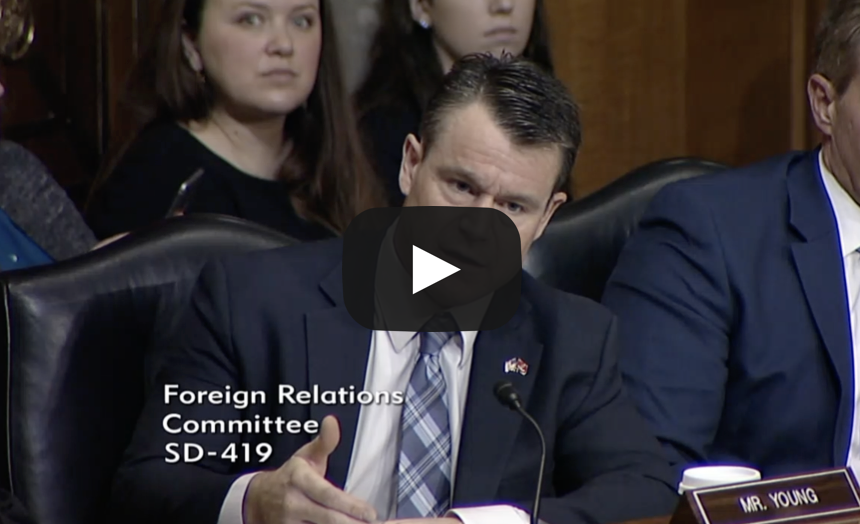VIDEO: Department of State Official Confirms Successful Humanitarian Efforts in Yemen, Applauds Young’s Efforts
|
WASHINGTON, D.C. – Following U.S. Senator Todd Young’s (R-Ind.) months-long campaign to address impediments to the delivery of humanitarian assistance in Yemen, a top Department of State official for the Middle East testified before the Senate Foreign Relations Committee today and confirmed the establishment of full humanitarian access to vital Red Sea ports, as well as the impending delivery of the four U.S.-funded World Food Programme cranes. In response to a question from Senator Young, Ambassador David Satterfield, the Acting Assistant Secretary for the Bureau of Near Eastern Affairs at the Department of State, testified that, “We have now full access to commercial and humanitarian goods through Hodeidah and Saleef ports.” Hodeidah and Saleef ports are two of the most important Red Sea ports for the delivery of food and fuel to millions of Yemenis on the verge of starvation. Satterfield noted that this access has already resulted in lower fuel prices and increased availability. Calling it a “major accomplishment,” Satterfield also told Young that the four U.S. taxpayer funded World Food Programme Cranes are expected to arrive at the Hodeidah port on Sunday. At least since January 2017, the Saudi-led coalition has blocked the delivery of the cranes, which will dramatically increase the capacity of the most important port in Yemen to deliver food and other humanitarian supplies to people suffering in the world’s largest humanitarian crisis. Highlighting that the Saudi actions violated humanitarian principles, international law, and U.S. law, Senator Young has persistently focused on the delivery of the cranes for months. For example, Young pushed for the delivery of the cranes in a bipartisan April 2017 letter he led to the Saudi government. He also raised the issue in a July hearing he convened and again in a December letter to President Trump. Echoing the comments of others, Satterfield told Young, “We very much appreciate your efforts…” According to a report published on December 4, 2017, by the United Nations Office for the Coordination of Humanitarian Affairs, “17.8 million people in Yemen are food insecure. Out of this, approximately 8.4 million people are severely food insecure and at risk of starvation – a worrying increase of 24 percent.” Since March 2017, Young has used letters to the administration and the Saudi government, an administration nomination, multiple statements, hearings, a Senate resolution, and countless meetings, briefings and phone calls with senior administration officials, Saudi officials, and leaders of the NGO community to demand an end to the Saudi starvation blockade in Yemen. The humanitarian situation remains dire, but major progress in eliminating impediments to the delivery of food and fuel has been made. |
